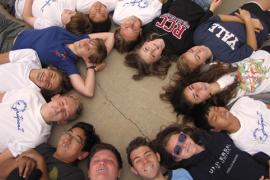One of the challenges of working at a summer camp is communicating to the outside world what it means to work at a summer camp. When we were young camp counselors, my dear friend Brienne carefully taped this common quote on the inside wall of her cabin: “From the outside looking in, you can never understand it. From the inside looking out, you can never explain it.” Brienne, melancholy with the thought of leaving camp for the year, was probably thinking about returning to college and boring her roommates with camp stories that did not make sense to anyone who wasn’t there. Just as noncamp friends never seem to understand what is special about our summers at camp, many employers and admissions officers do not understand what is so special about a person who has worked at camp.
As camp staff seek jobs or educational experiences outside of the camp world, they could be lucky enough to have someone who has been on the “inside looking out” review their appli¬cation. It is more likely, however, that the person reviewing their application is on the “outside looking in” and needs help understanding why camp has prepared this individual to take on the challenge at hand. It is up to staff to prepare resumes and applications that fully describe all of their skills and traits. It is our duty as camp directors to ensure the letters of recommendation they include with their applications fully help translate their camp skills to the outside world. If you can use a letter of recommendation to endorse a staff member’s hard work at camp and help translate it for someone on the outside to understand, it is one of the greatest services you can give to your staff member. While this article focuses on writing reference letters for staff, consider these techniques for camper references as well, should a camper ever request one for college admissions, an award, or a scholarship application.
Next time you are asked to write a recommendation letter for a member of your staff, refer to the following steps to give the staff member the boost that he or she deserves:
1. Gather all of the information you need for the letter. What is the job or educational program? Deadline? To whom should it be addressed? Visit the program or school’s Web site to give your letter context. Avoid using “To Whom It May Concern,” says Janine Fugate, the vice president of marketing and communications at Scholarship America, the nation’s largest nonprofit, private-sector scholarship and educational support organization (J. Fugate, personal communication, March 5, 2013). For scholarship programs, she says, it helps to address the letter to the specific committee.
2. Talk with the person you are recommending. What does he or she think you should highlight? Why does he or she want to be in this particular program or take this particular job? What does he or she identify as some of the biggest things he or she learned at camp? Biggest contributions to the camp program?
3. Make sure you are in a good mood. No one deserves a grumpy recommendation-letter writer. Get your coffee, silence your phone, put on some music. Don’t wait until the last minute because then you will definitely be grumpy.
4. At the same time, be honest. In fact, letters of recommendation are now commonly referred to as “letters of reference” to remove the bias that the letter is entirely positive. It is OK to mention any areas of improvement.
5. Read the person’s staff file. This is to refresh your memory but also to gather specific examples. Jot down a few notes on his or her past positions — highlights and areas of improvement. How has the person grown over time? Progressed? Make note of specific triumphs or challenges. Your hard work on end-of-summer evaluations really pays off here. Bonus: Pull any direct quotes you have in past evaluations from direct supervisors or coworkers.
6. Write your introduction. Keep it simple. You do not need to Google “letter of recommendation examples.” Say the person’s name, state the capacity in which you know that person (his or her job at camp), and then say you give him or her your highest recommendation. Also, be sure to translate the camp job for the reader — here’s an example for a leaders-in-training director:
In 2011, Hannah was the codirector of our Leaders-in-Training program, which served more than ninety high school students throughout the summer. In this capacity, Hannah planned three to four hours of daily curriculum for the campers to help them increase their leadership skills, teamwork abilities, and overall self-confidence.
7. Fill in the body of the letter. You might want to outline it first, but remember you can go back and edit it later. Steps eight through ten outline ideas for rich, meaningful content you can add to your letter. Essay-style is the most conventional, but Fugate says bullet points are OK as long as they are substantive.
8. Assess how the camp job relates to the new opportunity. “What helps me when I’m reading letters of reference is when the letter directly relates to whatever [the person] is applying for,” says Daniel Remick, the former dean of admissions at the University of Michigan Medical School (D. Remick, personal communication, March 6, 2013). Remick, currently the chair of and a professor of pathology at Boston University, has read thousands of letters of reference throughout his career. “Writing a good letter of reference takes some time,” he says. “You want to go and tailor the letter to the position the person is looking for — make the letter address topics that are going to be important for the new position.”
Just as we teach our staff members that our camper’s activity skills translate into life skills (fire building teaches perseverance; a capture the flag game leads to a sportsmanship lesson, etc.), we need to sketch out for the reviewer how camp staff skills have prepared the individual for this next opportunity. If the new job involves working with kids, the connections are more obvious:
When working with children, Melinda is patient and empathetic — when she listens to a child, she can make the child feel like he or she has have all of her attention. Her relationship building and devotion to kids’ needs has really shown each summer when returning campers arrive at camp. They are always eager to see Melinda, and she is just as excited to see them.
Teaching, social work, community services — these are somewhat self-explanatory. But how does camp relate to less-obvious opportunities?
Medical School: I am certain Ms. Heisel would be an excellent member of your medical school program and also an excellent medical doctor. I know this because I have seen her persevere in tough conditions and high-pressure circumstances. Her seven years at camp working with our camper population have given her a wealth of real-life experience on how to interact with kids of all ages, from all backgrounds, and in all different situations. Her work with children at Camp Al-Gon-Quian has also allowed her to make an educated choice about her career path as a pediatrician.
Yes — camp relates to medical school. The applicant has learned analysis, decision-making, and empathy skills. Use specific examples to show these skill sets.
Military Service: One day at camp this summer, we had to execute a missing swimmer drill as a “buddy tag” was left on the board af ter swimming activities. Joseph was on-point for the swim area during this time and organized all of the staf f members for our emergency procedure. Fortunately, we found the swimmer safe on land. Although this was a frightening circumstance, it showcased Joseph’s leadership abilities. Under pressure, Joseph showed strong communication skills and reacted quickly and appropriately.
Yes — camp relates to military service. The applicant has learned how to be cool under pressure, how to follow protocol, and how to lead others. This one example illustrates all of these traits and also shows the power of an anecdote.
Business School: Dan has inspired a generation of teens to continue the youth development work he has done within the camp program. Many of our younger staff members cite conversations or experiences they have had with Dan when they are asked about mentors and people who have helped them realize their own full potential. His ability to inspire and empower people has been invaluable to our camp program and culture.
Yes — camp creates a strong foundation for someone looking to lead others. This staff member’s legacy at camp highlights his ability to inspire.
9. Avoid adjectives without examples. “Make sure you have really great examples of what you are talking about,” Fugate says. “Don’t just say a student is outstanding — you explain why.” Standing alone, adjectives do not tell us much unless facts and anecdotes support them. Here’s an example:
Katharine is hardworking, creative, and determined.
OK — we have some adjectives. But do they tell the reader very much about Katharine? Does she stand out from other applicants? Try the next sentence instead:
Katharine knew the kitchen director position was an enormous undertaking, but she used pure grit, determination, and hard work in order to get the job done — and was extraordinarily successful.
This adds an extra dimension to the first statement — the thesis of the letter went from wishy-washy to punchy. Now, follow it up with how and why she was “extraordinarily successful.”
She came in way under her $90,000 budget, introduced new healthy foods, collaborated with a local farmer’s market, led a cohesive staff, and held the camp kitchen to the highest standards. When the health department came through on a very spur-of-the-moment visit, we had zero corrections. All of this was because of Katharine’s leadership.
These illustrations allow the reader to learn a ton more about Katharine than they would have with just a few adjectives. Her actions (described) speak louder than words!
10. Give the person a personality. Drop in some unique points about the individual that set them apart from the average applicant.
To this day, Stephen is well renowned as an epic activity planner — just ask him (or anyone who has been to Camp Al-Gon-Quian) about the “Zombie Apocalypse.” He was successful following protocol as the health assistant but was equally able to tap into his imagination to plan magical experiences for our campers.
Drake was able to bring her art background and knowledge to camp, inventing classes such as “Monet Is My Homie,” which allowed kids to appreciate art history and expanded our camp art classes far beyond tie-dye and friendship bracelets.
11. Proofread. My name is Sarah Kurtz and I will have a hard time reading your letter if you address me as “Sarah Klutz” (true story). Letter readers also appreciate it if the letters are kept short — in most cases, under a page. “Use a standard font, standard size margins, and make it easy to read,” Fugate says. “A scholarship committee member could be reading letters from 500–1,000 or more applicants!”
12. Have someone else proofread. Or at least read the letter aloud to yourself. Even better yet, find a noncamp person and ask him or her if the letter makes sense.
13. Follow all the steps and send it in ON TIME.
One of the best ways to appreciate your staff is to put it on paper; to tell the outside world about their potential and help them achieve their goals in life. And, according to Remick, letters of reference do make a difference: “I consider them a lot, particularly if they are written well. Most of the time, the letter writer has a lot more experience with the applicant than I do and knows things I can’t tell from a brief interview with that person.” Try to think of writing recommendation letters not as a chore but as staff appreciation: It is the best way to a repay a staff member for all of the great work he or she has done for your program. It is our obligation as camp directors to do it right.
Additional Resources
The more sample letters you can read and the more perspectives you can gain will help you immensely when writing letters of reference. But beware not to pla¬giarize or fall into the trap of relying on a template! These types of letters can be counterproductive. Here are three resources you can check out to get your ideas flowing or get over writer’s block:
- Recommendation Letters That Made a Difference series by Dr. Nancy L. Nolan. This series will give you examples of all different sorts of reference letters for a multitude of applications, from undergraduate programs through law school (Magnificent Milestones, Inc., 2010–2012).
- Perfect Phrases for Letters of Recommendation by Paul Bodine, part of the Perfect Phrases series. If you are stumped on how to start your letter, how to describe a specific skill, or how to tailor a letter to a particular program, this book has a wealth of information. One chapter that could be of great use to a camp direc¬tor is “Perfect Phrases for Raw People Skills — The Human Touch” (McGraw- Hill, 2010).
- How to Write Powerful Letters of Recommendation by Susan Whalley, M Ed. Although geared toward teachers, this book includes a list of descriptive words, a step-by-step guide, and fifty-two sample letters (Educational Media Corporation, 2000).
Sarah Kurtz is the director of Camp Al-Gon-Quian, the Ann Arbor YMCA’s residential camp in Northern Michigan, and a graduate of the Medill School of Journalism at Northwestern University.
Originally published in the 2013 November/December Camping Magazine



